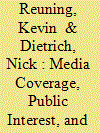| Srl | Item |
| 1 |
ID:
167434


|
|
|
|
|
| Summary/Abstract |
Why do citizens support violations of their own rights? We know a good deal about why governments sometimes restrict access to information and political participation through censorship, repression, or forced disappearances. But we know little about why citizens sometimes support these government encroachments on their own freedoms. We test one conventional explanation for this phenomenon—that individuals trade freedom for security—by conducting a survey experiment that examines public support for limits on freedom of speech. Our results suggest that external threats do, in fact, increase the willingness of citizens to accept curtailments of their right to free speech. They provide strong evidence that citizens respond to risk with an increased desire for security, even when that security comes at the expense of their individual freedoms. This finding suggests a research agenda examining the interactions between governance and threat perception, including how states manipulate demand for human rights in practice, how citizens evaluate threats to security in the context of conflicting information, and how fluctuating demand for rights influences the dissent-repression nexus.
|
|
|
|
|
|
|
|
|
|
|
|
|
|
|
|
| 2 |
ID:
165856


|
|
|
|
|
| Summary/Abstract |
Donald Trump’s success in the 2016 presidential primary election prompted scrutiny for the role of news media in elections. Was Trump successful because news media publicized his campaign and crowded out coverage of other candidates? We examine the dynamic relationships between media coverage, public interest, and support for candidates in the time preceding the 2016 Republican presidential primary to determine (1) whether media coverage drives support for candidates at the polls and (2) whether this relationship was different for Trump than for other candidates. We find for all candidates that the quantity of media coverage had significant and long-lasting effects on public interest in that candidate. Most candidates do not perform better in the polls following increases in media coverage. Trump is an exception to this finding, receiving a modest polling bump following an increase in media coverage. These findings suggest that viability cues from news media contributed to Trump’s success and can be influential in setting the stage in primary elections.
|
|
|
|
|
|
|
|
|
|
|
|
|
|
|
|